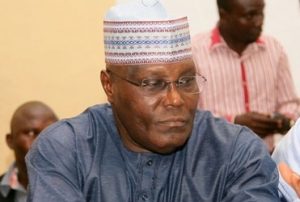FORMER Vice President Atiku Abubakar has been singing a tune, which I find strange for a Northern politician of Fulani extraction.

Ordinarily, there should be no nexus between tribe and ideology, in that anyone from any ethnic background could be a Marxist, Capitalist, Theocrat (Islamist or Christian fundamentalist, if there is any such thing) or the everything-goes Libertarians like Barack Obama and Hillary Clinton. But, the Fulani ethnic group in Nigeria, the founders of the Sokoto Islamic Caliphate which holds sway in the North and dominates the political landscape of Nigeria, are the ones primarily pushing the centralised Federalism which the Army ushered into our constitution in 1979 and 1999. Over-concentration of power in the Federal Government gives those who are in control direct access to manipulate the economic, political and social destinies of the nation to their own advantage (and often to the disadvantage of those who are less privileged). In my 30 years as a full-time practising journalist, I have come across many influential Fulani leaders, including a couple of Sultans. Of the whole lot, Atiku Abubakar, the Turaki of Adamawa, is the only one preaching “restructuring” and “true federalism”. The late Professor Bala Usman was a renowned “leftist”, so is Balarabe Musa. I am not sure of the ethnic background of the late Mallam Aminu Kano, a leading light among the Northern progressives who was considered a “radical” for preaching that the poor (rather than the overfed ruling aristocracy) should be the primary focus of government. Then, there are the Aminu Kano-raised politicians, such Alhaji Sule Lamido, Dr. Junaid Mohammed and the late Alhaji Abubakar Rimi and others who are left-leaning centrists. All these names mentioned above would readily jump into the fray and proclaim their “radical” orientation. But ALL of them were and are against “restructuring and true federalism” which Atiku now preaches. On this score, there is little to distinguish them from the reactionary Fulani elite, such Muhammadu Buhari and Nasir el Rufai, except that the former group will shrivel at the extremist levels to which the latter have gone in promoting nepotism and allowing armed Fulani militias to massacre other Nigerians unchecked; something that has never happened in over 100 years of Nigeria’s existence. Between 1993 and 2015, Atiku vied for the presidency four record times. Between 2003 (when, as the Vice President to Olusegun Obasanjo, he was physically muscled out of his ambition to run for president), he branded himself as a “democrat” as opposed to Obasanjo who was a military general. Since the past nineteen months, Atiku has moved from the crucible of his ethnic pack to canvass for what his fellow Yola Fulani townsman, Professor Jibril Aminu, would consider an anathema: campaigning for restructuring and true federalism. When he started making this call in June this year at the launch of Chido Onumah’s book: We Are All Biafrans in Abuja, I was shocked but skeptical. Shocked because he chose a book launch in which the taboo word: “Biafra” was on display; skeptical because even Muhammadu Buhari’s campaign promises included “restructuring and true federalism”, which are totally alien to his known political reflexes. Since Buhari assumed power as an elected President, no one (not even his coalition partner, Asiwaju Ahmed Bola Tinubu) has dared to ask him to fulfill that campaign promise, which must have impressed many who voted him from the South (especially South West). I wrote an article, challenging Atiku to come out and define what he meant by “restructuring and true federalism” to enable us compare his thoughts to Buhari’s litany of (largely bogus) campaign promises. Now Atiku has come into the open with his “restructuring and true federalism” idea. He is now beginning to sound like those of us who strongly believe that the way only to ensure peace, stability, prosperity and the durability of Nigeria, is to restructure its Federalism and devolve more powers from the Centre to the federating units. Atiku chose the auspices of another book launch in Abuja last weekend, to deliver a lecture entitled: “Strength and Unity in Renewal: Towards a Rebirth of Nigerian Federalism”. He made it clear that we must return to the pre-civil war true federal structure which made Nigeria a functional country. Unlike Buhari who says Nigeria’s unity is “non-negotiable” in a manner of threatening those who call for such with military violence, Atiku says it is odd to say we cannot renegotiate our existence. He criticises those who fear that negotiation will lead to a break-up of Nigeria. I quote him:
“Every political relationship is open for negotiations, without pre-set outcomes. As a democrat and businessman I do not fear negotiations. That is what reasonable human beings do. This is even more important if a stubborn resistance against negotiations can lead to unsavoury outcomes”. The assignment before the Turaki is to talk sense into his fellow Northern politicians to adjust themselves to the reality of the fact that Nigeria will implode suddenly one day unless we renegotiate our unity to strengthen it. The Biafra and Niger Delta agitations will NEVER stop until we negotiate a country where all Nigerians will be free, have a sense of belonging and a stake in the ways they are governed. The North needs true federalism more than the rest of us because it will be the greatest loser if an implosion occurs. Atiku should forge a strong political alliance with genuinely progressive-minded Nigerians and form a political party that will boldly table a true federalist agenda for the restoration of Nigeria. Let Nigerians be given the choice between the True Federalists and the Centralised Federalists in the elections of 2019. These boldly defined clear choices will make the 2019 elections not only exciting but also ideologically-based and a turning point of our democracy. I hope the Turaki will be courageous enough to make the move, and see what a profound mark he will leave on the sands of our nation’s political history!
